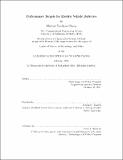Performance targets for electric vehicle batteries
Author(s)
Chang, Michael Tse-Gene
DownloadFull printable version (1.149Mb)
Other Contributors
Massachusetts Institute of Technology. Technology and Policy Program.
Advisor
Jessika E. Trancik.
Terms of use
Metadata
Show full item recordAbstract
Light-duty vehicle transportation accounted for 17.2% of US greenhouse gas emissions in 2012 [95]. An important strategy for reducing CO₂ emissions emitted by light-duty vehicles is to reduce per-mile CO₂ emissions. While one approach is to improve vehicle efficiency, greater reductions in emissions can be achieved by switching from gasoline vehicles to electric vehicles, if the electric vehicles run on electricity from clean energy sources. Batteries affect the consumer adoption of electric vehicles by influencing two important vehicle characteristics: cost and driving range on a single charge. The cost of the battery is a significant fraction of total vehicle cost, and the battery's energy capacity determines driving range. To lower battery costs and improve battery energy capacity, further research is needed. To guide such research, several organizations have created performance targets for batteries, including the Advanced Research Projects Agency-Energy (ARPA-E) and the US Advanced Battery Consortium (USABC). The goal of this thesis is to assess these performance targets based on real-world vehicle performance. A method is developed for estimating the energy requirements of personal vehicle travel, which improves upon previous methods by accounting for per-trip variation of vehicle energy consumption and analyzing data with wider geographic scope. The method consists of a model of battery-to-wheel vehicle energy consumption and a conditional bootstrap procedure for combining GPS travel data with large-scale data from the US National Household Travel Survey. The research finds that the distribution of energy requirements for US vehicle-trips and vehicle-days (the sum of all trips taken in a day) has a heavy tail, namely that a small proportion of long trips accounts for a disproportionately large amount of energy consumption. Current electric vehicle batteries (2011 Nissan Leaf) can satisfy 83% of vehicle-days, which account for 53% of all energy consumed in personal vehicle travel, while batteries that meet the performance targets can satisfy 98 to 99% of vehicle-days, which account for 90 to 96% of energy. These results allow for a quantification of the benefits of meeting performance targets for battery energy capacity, which can help assess technology readiness and guide allocation of research funding.
Description
Thesis: S.M. in Technology and Policy, Massachusetts Institute of Technology, Engineering Systems Division, 2015. This electronic version was submitted by the student author. The certified thesis is available in the Institute Archives and Special Collections. Cataloged from student-submitted PDF version of thesis. Includes bibliographical references (pages 79-88).
Date issued
2015Department
Massachusetts Institute of Technology. Engineering Systems DivisionPublisher
Massachusetts Institute of Technology
Keywords
Engineering Systems Division., Technology and Policy Program.